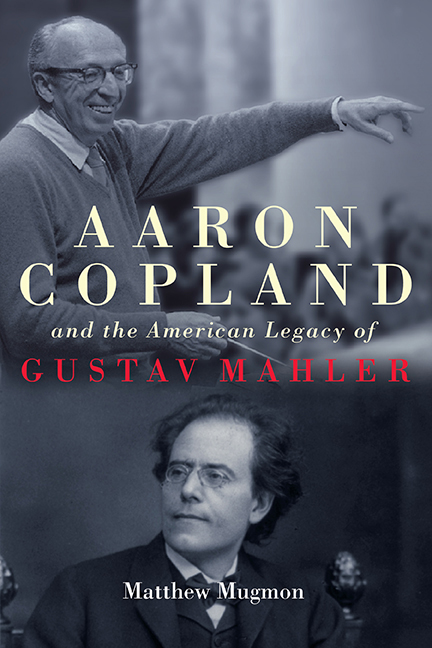Book contents
- Frontmatter
- Dedication
- Contents
- Acknowledgments
- Note on Musical Examples
- Introduction
- 1 Mahler and Copland in New York
- 2 Mahler in Nadia Boulanger's Studio and Beyond
- 3 Copland in Defense of Mahler
- 4 Mahler in Copland's Jewish Romanticism
- 5 Mahler's Idiom in Copland's “American” Sound
- 6 Copland, Koussevitzky, Mahler, and the Canon
- 7 Copland's Role in Bernstein's Mahler Advocacy
- Conclusion
- Notes
- Bibliography
- Index
- Eastman Studies in Music
1 - Mahler and Copland in New York
Published online by Cambridge University Press: 18 September 2019
- Frontmatter
- Dedication
- Contents
- Acknowledgments
- Note on Musical Examples
- Introduction
- 1 Mahler and Copland in New York
- 2 Mahler in Nadia Boulanger's Studio and Beyond
- 3 Copland in Defense of Mahler
- 4 Mahler in Copland's Jewish Romanticism
- 5 Mahler's Idiom in Copland's “American” Sound
- 6 Copland, Koussevitzky, Mahler, and the Canon
- 7 Copland's Role in Bernstein's Mahler Advocacy
- Conclusion
- Notes
- Bibliography
- Index
- Eastman Studies in Music
Summary
Aaron Copland was only seven years old when Gustav Mahler crossed the Atlantic Ocean and arrived in New York to begin what would turn out to be the final phase of his conducting career. With Mahler's death in 1911, the overlap between the two composers’ lives, even if they shared the same city during part of that time, turned out to be quite brief. Although Copland and Mahler likely never came into contact with each other personally, Copland's early years, including Mahler's time in America, were a time of significant developments in ideas about both American musical identity and Mahler's musical value. Mahler's works—despite his central role in New York's musical life—occupied a space on the periphery of the symphonic world as the product of a composer whose long, rarely heard compositions stood at some distance from the established Austro-German tradition. Whether Copland first encountered Mahler's music in New York or when he traveled to Europe in 1921, the fact that Mahler's work was at this time on the outskirts of the orchestral mainstream allowed him to respond to it with fresh ears, and without undue influence from critics or Copland's teacher, Rubin Goldmark.
In Copland's childhood years, Mahler's legacy in the United States was beginning to form, with mixed commentary on the artistic value of his music. In his time with the New York Philharmonic, Mahler introduced his own first two symphonies to the United States in 1908 and 1909. (The first Mahler work to be heard in the United States was his Fourth Symphony, in 1904, with Walter Damrosch conducting the New York Symphony Society and soprano Etta de Montjau singing the fourth movement; in 1906, Wilhelm Gericke led the Boston Symphony Orchestra in Mahler's Fifth Symphony.) Mahler's refusal to sanction program notes irritated the critic Henry Krehbiel, who considered his First Symphony impenetrable without the help of explanatory details. Krehbiel did have positive things to say about Mahler; he noted an “exquisitely lovely and profoundly moving” melody in the First Symphony's finale, but he also called Mahler “a naïve though unoriginal melodist, who, had he not been drawn into the latter-day swirl by a desire to exploit new colors, new harmonies and new notions about form, would have become a true symphonist.”
- Type
- Chapter
- Information
- Aaron Copland and the American Legacy of Gustav Mahler , pp. 10 - 19Publisher: Boydell & BrewerPrint publication year: 2019



